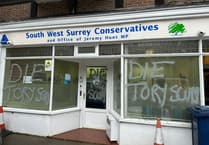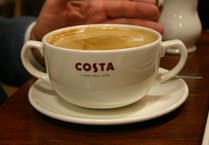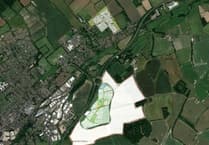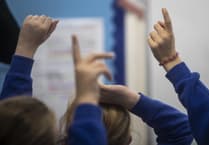HART Wildlife Rescue is celebrating its 20th anniversary this month by issuing an SOS for greater support to tackle the increasing demand for its services.
Based in Medstead, near Alton, the wildlife charity is calling on the public for increased support to help secure its survival following a fall in income and a growing demand for the rescue and rehabilitation service it offers for all native wildlife.
Founded by Bob and June Gibbs in a single shed in their Overton back garden, Hart Wildlife Rescue was born out a realisation that there was nowhere locally for the RSPCA or the public to take wildlife in need of care and, as a result, many animals were suffering or being put down unnecessarily.
A Hart Wildlife Rescue spokesman said: “Many people believe that vets and the RSPCA will treat and rehabilitate injured wildlife, but that is rarely the case, and Hart receives a considerable number of animals each year directly from local vets and the RSPCA, whose alternative option is usually to euthanise injured wildlife.”
In the early days, Hart looked after hedgehogs, too small to hibernate in the wild, to help the RSPCA. As the operation expanded, the Gibbs erected an insulated shed and soon started taking in other wild animals. Now the charity has a purpose-built animal hospital in Medstead which has many rooms to house different types of animals and including an isolation room for animals suffering from infectious diseases, such as mange.
It also has outdoor units and aviaries for large birds, birds of prey and other animals that need minimal human contact throughout their rehabilitation.
It is one of only a few units in the country with a licence to hold grey squirrels and is actively involved in research into hedgehog populations and diseases.
Since the charity began, staff and volunteers have treated more than 20,000 animals, including more than 5,000 hedgehogs, which form between 25 and 30 per cent of the intake. At Medstead, staff treat more than 1,400 wildlife casualties per year, including birds of prey, bats, and deer.
Peter Mart, chairman of trustees, said: “The charity’s made a huge difference so far and we’re proud of what we’ve achieved. But the need for our services is greater than ever, and sadly this year we had to close to new admissions on several occasions because we were full.
“This comes at a time when our costs are rising and our regular sources of donations are no longer enough to pay all the bills.”
He believes this has come about for several reasons: the squeeze on the economy has affected people’s disposable incomes, and the pressures on retail have affected sales in Hart’s charity shops.
In addition, applications for grants are increasingly competitive, and Hart Wildlife Rescue staff and volunteers have had to focus on treating animals rather than raising money which has led to a fall in income over the last three years.
Mr Mart said: “While we’ve done all we can to keep our costs low, these financial pressures are leading to an unsustainable position where we are relying on our reserves to get through the year. We’re calling on the public to help support us so we can continue to save our local wildlife.”
According to Mr Mart, over the last 20 years the native wildlife has faced greater and greater challenges.
“Key habitats have been lost as more houses and roads are built, pushing wildlife into ever closer contact with people. Farmers are struggling with decreasing profits, putting wildlife friendly practices low down the list of priorities, resulting in key changes in our landscape like hedgerows being removed.
“Our gardens have become less wildlife friendly as we add decking and patios, remove ponds, and make them low maintenance and tidier. Roads have become busier, and protecting our wildlife has been given lower priority by successive governments.
“What’s more, an ongoing pressure on wildlife is caused by pets, especially cats. The majority of animals seen in our hospital are directly as a result of some sort of interaction with people and their pets, whether caught by cats, nests disturbed during gardening or building work or road traffic accidents, or orphans whose parents are likely to have been killed as a result of one of these, and so helping these wild animals is really everyone’s responsibility.”
The charity, which needs to raise £150,000 every year to keep running, is also facing new challenges, such as changes in legislation that affect its use of veterinary medicines. This now limits some of the treatments it can provide on site. But in Hart’s experience “referring animals for treatment off-site significantly increases costs, and stress, to the animals themselves.”
The charity is seeking a new patron to help raise the profile of the charity, two extra trustees with skills and experience of media, marketing and/or fundraising as well as committed volunteers to help care for the animals, or support the day-to-day management of the charity. The charity is run entirely on donations, and so any donations are always very gratefully received.
The public can help by donating time, money, goods or expertise, such as:
* Donating quality items to the Hart shop, located in the Alton Community Centre car park;
* Using easyfundraising.co.uk for all online shopping to raise funds for free;
* Buying items from Hart’s Amazon wish list, such as cat food for feeding hedgehogs, or Anigene to keep the hospital clean and safe for all our patients;
* Donating money via the website or by texting HART11 £10 to 70070 to give £10;
* Becoming a member for just £20 a year to support HART’s work and keep up to date with its activities;
* Donating used newspaper to the hospital to be shredded for hedgehog bedding
For more information or if you find a wildlife casualty and want to know what to do visit hartwildlife.org.uk or call 01420 562335.




